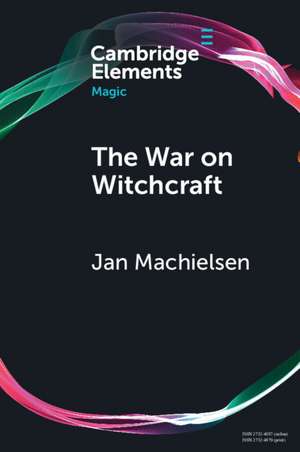The War on Witchcraft: Andrew Dickson White, George Lincoln Burr, and the Origins of Witchcraft Historiography: Elements in Magic
Autor Jan Machielsenen Limba Engleză Paperback – 21 iul 2021
Preț: 142.39 lei
Nou
Puncte Express: 214
Preț estimativ în valută:
27.25€ • 28.41$ • 22.65£
27.25€ • 28.41$ • 22.65£
Carte tipărită la comandă
Livrare economică 20 martie-03 aprilie
Preluare comenzi: 021 569.72.76
Specificații
ISBN-13: 9781108948746
ISBN-10: 110894874X
Pagini: 75
Dimensiuni: 151 x 227 x 4 mm
Greutate: 0.1 kg
Editura: Cambridge University Press
Colecția Cambridge University Press
Seria Elements in Magic
Locul publicării:Cambridge, United Kingdom
ISBN-10: 110894874X
Pagini: 75
Dimensiuni: 151 x 227 x 4 mm
Greutate: 0.1 kg
Editura: Cambridge University Press
Colecția Cambridge University Press
Seria Elements in Magic
Locul publicării:Cambridge, United Kingdom
Cuprins
1. 'Ding! Dong! The Witch is Dead'; 2. Two Historians on a Double Date: White and Burr Meet Flade and Loos; 3. History and a Reformer's Project of Reform; 4. The Reformer's Apprentice; 5. Meditations on Masculinity; 6. Reflections.
Recenzii
'… Masculinity emerges as an important theme. Machielsen shows that White and Burr both saw history as a story of Great Men, and actively valued masculine characteristics. I hope that this book will be taken up as a contribution to the history of nineteenth-century masculinity.' Julian Goodare, Folklore
Descriere
How did nineteenth-century historians construct the popular understanding of witchcraft as representing the irrational past?









